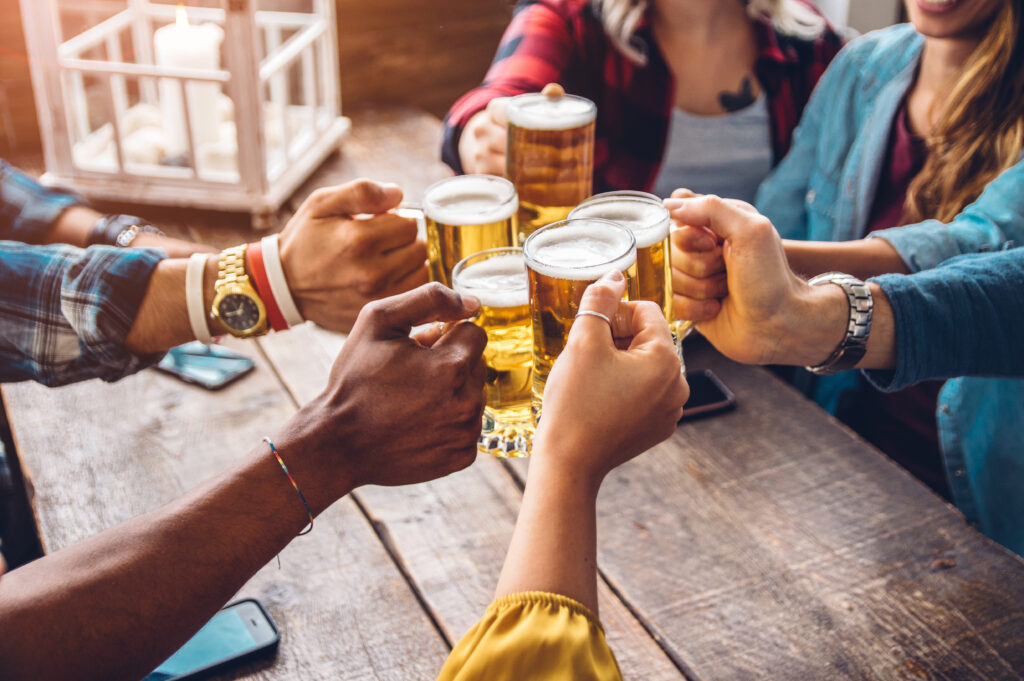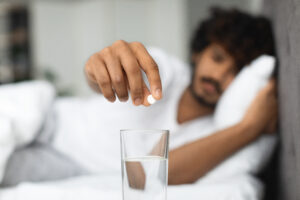Understanding the Effects of Alcohol and Drinking Safely

By law, alcohol is meant to be bought and drunk by adults over 18, but a lot of young people under this age drink. We’re not here to judge. This blog gives you the information you need to understand more about the effects of alcohol and how to stay safe.
Jump to:
‘How to drink safely (and avoid a hangover)’
‘Help and support’
Why do people drink alcohol?
There are many different types of alcohol, like beer, wine, and spirits.
Alcoholic drinks can change the way your mind and body work and feels. It can affect your speech, how your muscles work, your sensory organs and your sweat glands.
Some people drink to feel relaxed, enjoy social gatherings, get rid of nerves, and have fun. But sometimes it can be a problem. Sometimes people can become dependent on alcohol to function, or binge drinking can lead to dangerous or harmful decisions.
How does alcohol affect my mind?
When you drink alcohol, you’re more likely to take risks which could be dangerous. You might cross the road without looking, be more open to taking illegal drugs, or go home with someone you don’t know. If you were sober, you might think about the consequences of doing these things, but drinking alcohol can affect your judgement and your decisions.
Alcohol can also affect your memory, attention, and concentration. You might forget where you put your phone or wallet or struggle to focus on what your mates are telling you. Alcohol can make it difficult to think clearly and take in information about your surroundings.
How does alcohol affect my body?
Alcohol can slow your reflexes down in reaction to things happening around you. Drinking can also cause you to lose your balance, so you’re more likely to have an accident, fall, or injure yourself when you’re tipsy or drunk.
Have you heard the term “don’t break the seal”? You usually need to pee more often when you’ve had a drink. This can lead to dehydration as you’re getting rid of water from your body. Symptoms of dehydration include having a dry mouth, feeling tired, and getting dizzy.
Alcohol can also irritate your stomach and intestines, which can cause stomach pain, nausea, and vomiting.
The dreaded hangover
Once you’ve had enough of drinking, you might stumble off to bed and hope to sleep it off. If you’ve drank a lot, the likelihood is that you’ll wake up feeling rubbish. The horrible feeling after drinking too much the day before is called a hangover.
Typical hangover symptoms include a headache, fatigue, dehydration, nausea, vomiting, and sensitivity to light and sound. You may also find it difficult to concentrate.
Hangxiety is a thing! It’s common to feel anxious, upset or irritable the day after. This is because alcohol is a depressant. It may give you a short high but can leave you feeling low. This is usually because you’re dehydrated and have lots of toxins still in your body. Lack of sleep can also be a factor.
Don’t worry; hangovers are short-lived and only last a day or two on average.
Can drinking too much affect me in the long term?
Research says that the brain doesn’t fully develop until you’re 25. Drinking too much alcohol in your teenage years can change the way that your brain develops, which can lead to potential long-term problems with memory, learning and decision-making.
Over time, your tolerance for alcohol increases, which means you have to drink more before you feel the same effects on your mind and body. People who drink too much alcohol report experiencing more difficulties with their mental health than those who don’t drink alcohol as often. It can also lead to conditions like liver disease and heart problems.
Alcohol is an addictive substance, and some people depend on it to function properly. It can also lead to other drug addictions.
How to drink safely (and avoid a hangover)
- Eat before drinking – it helps absorb the alcohol
- Drink in moderation – don’t be pressured to ‘chug’
- Keep hydrated – drink water between alcoholic drinks
- Set boundaries – don’t feel forced to drink more than you want
- Understand personal tolerance – alcohol doesn’t affect everyone in the same way, so don’t try to compete
- Order alcohol-free options – people won’t notice the difference if you don’t want them to know
- Never drink and drive – you risk losing your license and could seriously harm yourself and/or others
- Cooking when drunk is a fire risk – prepare snacks that don’t need cooking or buy take out
- Plan sober socials – like a board game or film night, go for a picnic, bowling or mini golf
- Avoid spiking – don’t leave your drink unattended, and dance with your hand or thumb over your glass or bottle
- Think you’ve been spiked? Tell someone at the bar straight away
- Don’t lose things when drunk – keep valuables in a safe space and transfer a small amount of cash to a different card
- Be careful if on prescription medication or using illegal drugs – alcohol can react badly with these (talk to your doctor)

Help and support
Meic – if you’re feeling pressure to drink more than you want to or need to talk to someone about anything worrying you, talk to Meic on the phone, text, or online chat. Free, confidential information, advice and advocacy.
DAN 24/7 – a free bilingual drug and alcohol helpline open 24 hours a day, 7 days a week. Call on 0808 808 2234 or text DAN to 81066.
Drinkaware – a charity working to reduce alcohol-related harm, helping people make better choices about their drinking. Open 24 hours a day, 7 days a week. Call 0808 808 2234 or text DAN to 81066. Are you drinking too much? Take the self-assessment quiz on the Drinkaware website to see.
NHS Wales – information and advice on alcohol misuse
Alcohol Change UK – Offering information and support to reduce alcohol harm. Lots of tips and tools on their website, including the Try Dry app to help you cut down.






















